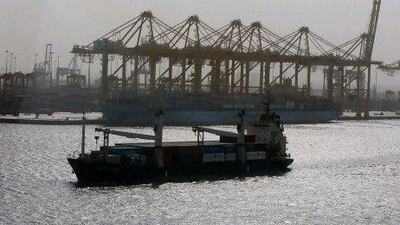Two large government-owned companies in Dubai may struggle to refinance debt next year without state support, the global credit ratings agency Standard and Poor's (S&P) warned yesterday.
Finance:
Industry Insights Exclusives you can bank on from The National's premium content. Learn More
DIFC Investments (DIFCI), an investment arm of Dubai's financial free zone, and the Jebel Ali Free Zone (JAFZ), which runs the business district around Dubai's biggest port, "will likely struggle to refinance without some form of government support", S&P said.
DIFCI must repay a US$1.25 billion (Dh4.59bn) Islamic bond by next June, while JAFZ faces $2bn in bonds due in November.
The warning comes amid fresh concern about the health of Dubai's government-owned companies following the completion of Dubai World's debt restructuring. Dubai World, which holds some of the emirate's most prized assets, finalised new terms on $24.9bn of debt this year.
Moody's Investors Service, another major ratings firm, has already raised alarm this month over Dubai's refinancing. It singled out JAFZ, DIFCI and Dubai Holding Commercial Operations Group as especially vulnerable to refinancing risks.
Recent estimates put total debt maturities for Dubai and its government-linked companies next year at about $15bn.
"Dubai's economy appears to be starting to rebound," S&P analysts said in their report yesterday. "However, the Dubai government-related entities that [S&P] rates are up against significant risks from the weakening global economic outlook, the Arab Spring, and the volatile equity and bond markets. These risks have raised concerns as [government-related companies] face large debt maturities and refinancing needs in 2012."
The Dubai Government said it did not intend to restructure more debt owed by its companies next year following the release of the Moody's report.
Analysts are not expecting a major new wave of companies negotiating revised terms on debt and extending maturities to avoid default. Rather, they say, the risk is that the willingness of banks to refinance debt and investors' willingness to invest in new debt might be constrained next year. And that may mean some companies need help to make payments on large loans and bonds as they come due.
Dubai has mechanisms in place to provide such aid, at the centre of which is the Dubai Financial Support Fund (DFSF).
The DFSF was set up two years ago to distribute the proceeds of a $20bn financing package from the Central Bank, the Abu Dhabi Government and a pair of Abu Dhabi government-owned banks. The aid was provided in response to the financial crisis and Dubai World's restructuring.
In its report, S&P said it considered some of the five companies based in Dubai it rates as more likely to receive government support than others in the event of financial distress, which factors into the credit ratings it assigns them.
The Dubai Electricity and Water Authority, Dubai's main utility, and DIFCI were both assigned a high likelihood of government support, helping their ratings. JAFZ is moderately likely to receive support, and DP World and Emaar Properties have a low likelihood of receiving aid, the report said.
S&P's credit ratings are meant to help investors gauge the risk of a company or government defaulting on financial obligations. DIFCI and JAFZ's ratings have negative outlooks, which "are linked to the refinancing of their respective [Islamic bonds] maturing in June and November 2012. The outlooks are unlikely to change until we consider that both entities have adequately addressed these refinancings".
JAFZ is currently rated "B" and DIFCI is rated "B-plus" on S&P's scale. Those marks are considered below investment grade, implying elevated risks.

